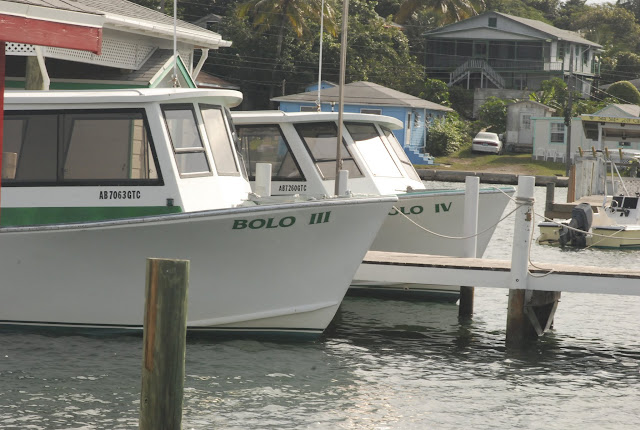One of the unique aspects of the Abacos is its Loyalist heritage. New Plymouth, the settlement near where we are moored, is a very well preserved authentic Loyalist town.
What exactly is a 'Loyalist' you ask? Well a Loyalist is an individual that remained loyal to King George during the American Revolutionary War, or as it is often called in the Commonwealth, 'The War of Rebellion'. Notice the founding date of New Plymouth and its proximity to 1776 and the following war.
There are actually two 'lines' of Loyalists, one of African slave heritage and the other better known one of European planter heritage.
During the war, the British offered sanctuary to slaves if they could escape and flee to British controlled territory - New York City was a prominent area. This was not a move borne out of abolitionist sentiment (the British at this time still supported slavery in their colonies), but rather a tactic to deprive the rebels of slave labor. Towards the end of the war, the Brits held true to their offer and numerous ships bearing former slaves left New York and transported the people to various locations, including Nova Scotia and the Bahamas.
A book that gives great insight into the entire slave experience and the slaves that went to Nova Scotia is http://www.amazon.ca/The-Book-Of-Negroes-Novel/dp/1443408980. In brief, they were not well treated in Nova Scotia.
At least one of the ships departing New York traveled to the Abacos, landing in what is now Treasure Cay right across the Abaco 'Sea' from Green Turtle. Those individuals formed a town near there and became the first Abaco settlers.
The other line of Loyalists, were British in heritage and largely planters from Virginia and the Carolinas. The history, as written here, speaks of harassment. confiscation of property, and even fear of imprisonment or death as traitors to the rebel cause. These were the people that fled the States and founded New Plymouth.
Their original goals were to recreate the plantation economy that they left in America, but the sparse rocky soil of the Bahamas did not support that end. Some left, but those that remained, turned to the sea for their livelihood: wrecking (salvaging ships that ran aground on the numerous reefs of the Bahamas), boat building, fishing, sponging, and yes a bit of smuggling as opportunity presented itself (munitions during the Civil War, alcohol during Prohibition). A great historical fiction book that gives insight into the Loyalist experience is http://www.amazon.com/Wind-Carolinas-Robert-Wilder/dp/1877838098
New Plymouth stands as a monument to these hardy families. The family names (Lowe, Roberts, Albury, Sawyer, and others) continue to echo through these islands.
 |
| Looking down from the 'hill' over the village and cemetery. |
 |
| The Cemetery New Plymouth has strong ties to Key West (how do you think they came to be named 'Conchs'). After a hurricane, a group from Key West came to help restore the cemetery. |
 |
| Loyalist Memorial Garden |
 |
| Statue depicting the first Landing of the Loyalists |
 |
| Quaint - almost New England architecture |
 |
| Narrow streets laid out long before cars and trucks |
 |
| Green Turtle Ferries - essential for travel to the mainland (Abaco) |
 |
| Primary School |
 |
| Our market here - Run by Scott and Martha Lowe - children of Sid Lowe the founder |
 |
| Bahamian business combination - liquor store and cafe - good Chicken Souse! |
 |
| You have to plan your business here - telephone office open only on Thursdays, same as the bank |
 |
| Our home here, a mooring from the one and only Donny Sawyer! |
After the cold front passing through here today, we hope to leave the middle of next week and travel to Marsh Harbour to visit with our friends/family at Grace Baptist Church.
Tom
Moored Black Sound
Green Turtle Cay,
Abaco, Bahamas






